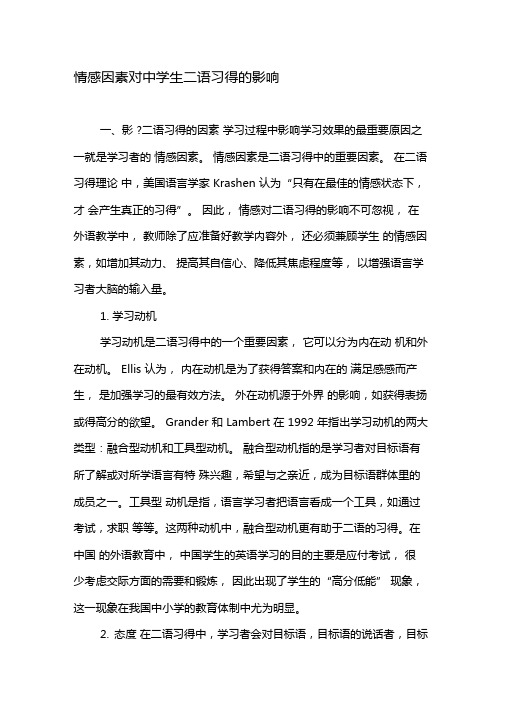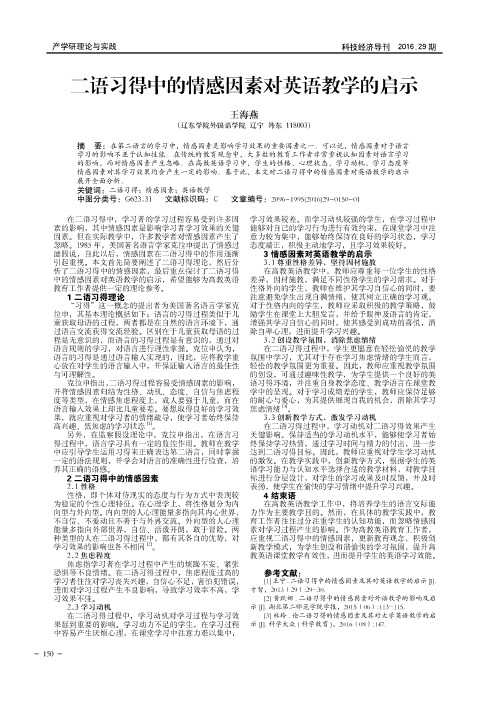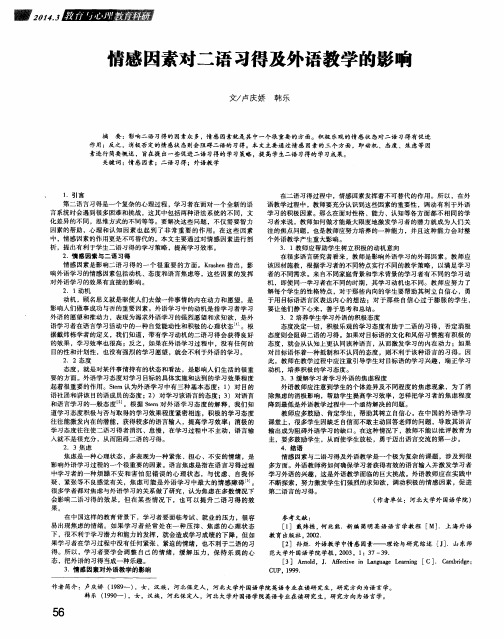二语习得中的情感因素及其对外语教学的启示
- 格式:doc
- 大小:25.50 KB
- 文档页数:3

情感因素对中学生二语习得的影响一、影 ?二语习得的因素学习过程中影响学习效果的最重要原因之一就是学习者的情感因素。
情感因素是二语习得中的重要因素。
在二语习得理论中,美国语言学家 Krashen 认为“只有在最佳的情感状态下,才会产生真正的习得”。
因此,情感对二语习得的影响不可忽视,在外语教学中,教师除了应准备好教学内容外,还必须兼顾学生的情感因素,如增加其动力、提高其自信心、降低其焦虑程度等,以增强语言学习者大脑的输入量。
1. 学习动机学习动机是二语习得中的一个重要因素,它可以分为内在动机和外在动机。
Ellis 认为,内在动机是为了获得答案和内在的满足感感而产生,是加强学习的最有效方法。
外在动机源于外界的影响,如获得表扬或得高分的欲望。
Grander 和 Lambert 在 1992 年指出学习动机的两大类型:融合型动机和工具型动机。
融合型动机指的是学习者对目标语有所了解或对所学语言有特殊兴趣,希望与之亲近,成为目标语群体里的成员之一。
工具型动机是指,语言学习者把语言看成一个工具,如通过考试,求职等等。
这两种动机中,融合型动机更有助于二语的习得。
在中国的外语教育中,中国学生的英语学习的目的主要是应付考试,很少考虑交际方面的需要和锻炼,因此出现了学生的“高分低能” 现象,这一现象在我国中小学的教育体制中尤为明显。
2.态度在二语习得中,学习者会对目标语,目标语的说话者,目标语的文化,社会价值以及特殊作用产生不同的态度,态度分为肯定的态度和否定的态度。
学习者对二语的学习持肯定态度,而且主动跟目标语的说话者交流,这样会对语言的学习有促进作用。
若学习者对目标语或目标语说话者持否定态度,会阻碍语言的学习。
根据学习表现,学习态度分为自觉型,兴趣型,说服型和强迫性。
自觉型和兴趣型受内在动机的影响,而说服型和强迫型受外在动机的支配。
端正的学习态度应是自觉型和兴趣型,有助于学习外语,说服型和强迫型的学习态度不利于学生的二语习得。

语言习得理论及其对外语教学的启示摘要:我们生活在语言的世界里,日常生活离不开语言。
语言是人与人交流不可缺少的重要工具,它既是一种文字,又是一门艺术。
语言习得是指一个人在自然的语言环境中,通过沟通意义的言语交际活动,不知不觉地获得一种语言。
本文试分析语言习得理论对外语教学的启示。
关键词:语言习得教学法认知论在日常生活中,离不开语言的沟通和表达。
在人与人的交流中,语言给人留下第一印象。
有了语言,才会有我们丰富多彩的文化,语言是文化的重要组成部分。
在社会这个大舞台上,以一个人的力量是很难在社会中存活下去的,我们必须借助各方面的力量,才能让自己走得更高更远。
然而,各方面的力量来源于社会大众,语言的交流可以让我们赢得更好的人际关系,得到别人的认可和尊重。
语言的重要性不言而喻,可以说,没有语言的交流,就没有一个民族乃至一个国家的进步与发展。
无论时代的发展脚步多快,都不会改变人与人的交流方式。
语言是如此的重要,那么语言是如何习得的,就成为我们的主要研究对象。
语言习得是人类语言发展的进程,第一次语言习得,关系到儿童时代的语言能力发展;而第二次语言习得,关系到成人语言的发展。
理论学家们一直都强调先天与后天是语言习得的最重要因素,也有其他理论学家认为儿童有先天的语言能力促进语言的学习,还有其他学者从认知能力和学习者与周围环境的互动因素中得出。
除此之外,研究语言习得有助于教师使用更有效的教学方法。
一、语言习得的定义及其与语言学习的区别语言习得是指在自然的语言环境中,通过旨在沟通意义的言语交际活动,不知不觉地获得一种语言。
语言习得是一种潜意识行为。
语言学习是指在课堂环境下有专门的教师指导,严格按照教学大纲和课本,通过讲解、练习、记忆等活动,有计划有系统有意识地对语言规则的掌握。
语言学习是一种有意识的行为。
二、语言习得的主要理论及其特点语言习得包括第一语言习得和第二语言习得。
儿童第一语言习得的过程分为喃语阶段(半岁到一岁)、独词句阶段(一岁左右)、双词句阶段(一岁半左右)、电报句阶段(两岁至两岁半)和成人句阶段(两岁半至五岁)。



论二语习得中情感因素的影响与启示摘要:情感因素是二语习得和教学中的重要因素。
它包括学习动机、态度、个性特征等。
情感因素对二语习得有很大的影响,积极、自信、放松的心理状态有助于语言习得;消极、压抑、焦虑的情绪会阻碍语言的习得。
本文将通过对昆明某英语培训机构的四位来华英语教师进行电话采访,总结整理成案例,来研究学习动机和态度对二语习得的影响,希望对对外汉语教学有所启示。
关键词:情感因素,二语习得,学习动机,态度,对外汉语教学一、研究的目的及意义情感因素对二语习得有重要影响,它们在不同程度上直接或间接地影响着学习者语言习得的效果。
本文将从学习动机和学习态度入手,通过对在华的外籍人员学习汉语的情况进行研究,探寻二语习得中情感因素的影响和启示。
二、研究方法介绍(一)调查对象本文的调查对象为二位外籍英语教师,收集案例,研究他们学习汉语的动机、态度等情况。
(二)调查方法1.访谈法,在与他们工作的半年里,有针对性的进行访谈。
以及后续的电话、微信等途径的访问。
2.文献研究法,查找文献,为研究打下理论基础。
三、案例分析影响学习效果的原因有很多,为了研究学习动机和态度对二语习得的影响,分别就汉语学习的问题采访了两位外籍英语教师,并整理成如下案例:(一)学习动机不明确,学习态度消极的案例案例一:Sam,女,2015年1月和丈夫Jack一起来到中国,汉语基础为零,夫妻二人共同在培训机构担任英语教师,Sam性格内向,不善于交流,而他的丈夫Jack性格外向。
Sam说她的丈夫Jack课余时间经常会和中国老师聊天或探讨问题,除此之外,还会向中国老师主动学习汉语日常用语,例如,如何点菜,如何问路,如何买东西等,点菜时对于菜单上的菜名,他都会让中国老师教他读,然后反复跟着读。
问及夫妻二人的汉语水平如何,Sam只会说“谢谢你”“好的”“你好”等简单词汇,其他依然听不懂,不能用汉语与他人交流,而Jack的汉语水平有所提高,基本点餐,打车,问路等日常用语已掌握,且能与他人简单交流。

二语习得理论对英语实际教学的影响及启示——以克拉申理论为例解读外国语学院英语系英语教育学课程论文题目: 二语习得理论对英语实际教学的影响及启示——以克拉申理论为例姓名: 李静茹学号: 201332010514 班级: 2013级 5班日期: 2016年6月评语成绩教师签名:目录摘要 (i)1.引言....................................................................................... .. (1)2. 二语习得理论的对英语教学的具体影响……………………..…….………………….1 2.1习得——学得假说………………….…………………………………………..….2 2.2 情感过滤假说………………………………………………….……...……….…23. 二语习得理论对于英语教学的启示………………………………………….…………..34. 总结...............................................................................................3 参考书目.. (5)摘要本文从第二语言习得理论着手,分析了二语习得理论对于英语教学活动的影响及启示。
以著名语言教育家斯蒂芬?克拉申的两大假说理论,习得——学得假说和情感过滤假说为例,分析了理论对于教学活动的指导意义,包括其对于学生的学习方式形成的解释及学生学习过程中情感的作用,从而更好地指导教师进行教学活动。
关键字:二语习得;习得——学得假说;情感过滤假说;英语教i1. 引言第二语言习得,是指“在自然的或有指导的情况下通过有意识学习或无意识吸收掌握母语以外的一门语言的过程”。
只是作为第二语言是开始于幼儿期,包括按时间的第三次或以后的任何语言的学习。
二语习得研究是为了系统地探讨二语习得的本质和习得的过程,其主要目标是:描述学习者如何获得第二语言以及解释为什么学习者能够获得第二语言。
---------------------------------------------------------------最新资料推荐------------------------------------------------------ 情感因素在二语习得中的作用及启示The Effects of Affective Factors in SLA and Pedagogical Implications Abstract: Affective factors include emotion, feeling, mood, manner, attitude and so on. They are the most important factors in SLA and English teaching. Under the guidance of the Affective Filter Hypothesis proposed by Krashen, this paper tends to make a brief analysis of the effects of affective factors in SLA and its pedagogical implications. That is to say, it is very helpful to study English with good mood, feeling, manner, and students can get more knowledge with good mood. On the contrary, students with poor English often feel tired, boring and even anxious when they attend the class. The affective factors will surely help the teachers to improve their teaching quality and students to cultivate an all-round development. 1. Affective Filter Hypothesis Affective Filter Hypothesis was proposed by Krashen. He put the Affective Filter Hypothesis into five central hypotheses in SLA, namely, the Acquisition-learning distinction; the Natural order hypothesis; the Monitor hypothesis; the Input hypothesis and the Affective Filter Hypothesis. Krashen argued that affective filter is a kind of psychological obstacle that prevents1 / 10language learners from absorbing available comprehensible input completely. He looked affective factors functioning as a filter that reduces the amount of language input the learner is able to understand. It has a close relationship with the language learners input and intake. It can be said that affective factors determine the proportion of language learners input and intake. The affective factors include certain emotions, such as motivation, self-confidence, anxiety, and so on in the process of acquiring a second language. These negative emotions prevent efficient processing of the language input, and on the contrary, the positive emotions promote the efficiency of the process. When language learners with high motivation, self-confidence and a low level of anxiety, they have low filters and so receive and take in plenty of input. On the other hand, learners with low motivation, little self-confidence and a high level of anxiety have high filters and therefore obtain little input. The Affective Filter Hypothesis shows that the emotional factors strongly affect the learnersinput and how much input is converted into intake. Thats the reason why Krashen stated that: the Affective Filter Hypothesis captures the relationship between affective variables and the process of second acquisition by positing---------------------------------------------------------------最新资料推荐------------------------------------------------------ that acquirers vary with respect to the strength or level of their affective filters. Those whose attitudes are not optimal for second language acquisition will not only tend to seek less input, but they will also have a high or strong affective filter-even if they understand the message, the input will not reach that part of the brain responsible for language acquisition, or the language acquisition device. Those with attitudes more conducive to second language acquisition will not only seek and obtain more input, they will also have a lower or weaker filter. They will be more open to the input, and it will strike deeper. (Stephan Krashen, 1982: 31) The Affective Filter Hypothesis has significant implications for foreign language teaching. A low filter should be created and advocated for the effective language teaching. It can be guessed that learners affective filters will be influenced by teachers feedback. Attempts should be made to lower the affective filter and let learners feel less stressed and more confident in a comfortable learning atmosphere. 2. The Affective Factors Affective factors in second language acquisition play an important role and some western scholars believe that its role is even more important than cognitive factors. They are related3 / 10to the learners emotional state and attitude toward the target language. The affective factors may hinder the learners to absorb input information because of a psychological barrier. The main affective factors include motivation, self-confidence and anxiety. 2.1 Motivation Motivation is considered to be one of the most important factors, which affect the learners language input and intake. It is commonly thought of as an inner drive, impluse, emotion, or desire that moves one to a particular action. Cardner defines motivation to learn a second language as the extent to which the individual works or strives to learn the language because of a desire to do so and the satisfaction experienced in this activity. It is considered as a key to successful learning. In a word, motivation is the process by which goal-directed behavior is stimulated in language learning. It drives and directs behavior. It is obviously that motivation directly and profoundly influences how often students use foreign language learning (FLL) strategies; how much input they receive in the language being learned; how high their general proficiency level becomes; and how long they persevere and maintain FLL skills after language study is over. Motivation is such an important factor in language learning that no teacher could avoid being concerned---------------------------------------------------------------最新资料推荐------------------------------------------------------ with his students motivation in the process of language teaching. 2.2 Self-confidence Self-confidence is considered to be another significant factor, which profoundly influences the learners language performance. It is a kind of optimistic emotion that language learners firmly believe they can overcome troubles to gain success. Self-confidence is to be a kind of active affective factor. As for foreigh language learners, self-confidence often plays a decisive role in foreigh language learning, and if you want to succeed, you should possess the major quality---self-confidence. The students who lack of confidence are usually found to be extremely fearful and timid, reluctant to express their opinions and even unable to utter a complete meaningful sentence in class. The concept of self-confidence can be defined as a process of producing the strongest force from the bottom of ones heart in doing something. It is a state of surpassing oneself consistently. Of all the possible characteristics that can affect language learning, self-confidence is very important for the following reasons. First of all, when a person has self-confidence he believes in himself. He believes that he can and will succeed, and gives5 / 10him the courage to try new learning. One would be willing totake some risks in order to be successful. Moveover, a confident person rarely gives up. Even they meet difficulties in the process of studying, they never give up. When their achievements are noticed more by others at school, they are more likely to succeed. To sum up, self-confidence is regarded asone of the most important factors in language learning process.It enables people to take risks, try again when they fail, and enjoy their accomplishments when they win. With these abilities,a confident student can succeed in language learning. All inall, self-confidence means a lot in language learning.2.3 Anxiety Anxiety is another influential factor in affective domain. It is thought to be the most important negative affective factor affecting foreign language acquision. It is associated with negative feeling, such as uneasiness, frustration, self-doubt, appreciation and tension. Anxiety maybe a kind of temporary psychological state, and also a kind of psychological character that can last for a long time. It isone of the most prominent and pervasive emotions. May (1996) comprehended that anxiety is the apprehension cued off by a threat to some value that the individual holds essential to his existence as a personality. It is a feeling of uneasy suspense,---------------------------------------------------------------最新资料推荐------------------------------------------------------ the tense anticipation of a threatening but vague event. According to Arnold (2000: 59), language anxiety ranks high among factors influencing language learning, regardless of whether the setting is informal or not (learning language on the streets) or formal (in the classroom). Students with anxiety attending the class will feel nervous and afraid to cooperate with teachers and then they cannot concentrate on the learning points and waste their energy or they just want to flee the learning task. Anxiety reveals that researchers have indeed use different constructs for their anxiety research and possible efficiency strategies should be taken to retard students anxious state and let them study at an ease atmosphere. Thus make students learn more language knowledge in the class.3. Pedagogical Implications According to the above analysis, the significance of the study of affective factors can be summarized into three major points below: To start with, motivation directly and profoundly influences how much knowledge they gained from learning language. With high motivation, students have high enthusiasm and spirit in English learning; they can concentrate themselves on classes. On the other hand, students who cannot concentrate themselves on7 / 10classes often have low motivation and they do not know the purposes of learning language. So the teachers should try their best to assure their students maintain high motivation in the process of SLA. In addition, self-confidence is another important factor, which influences the learners language performances. Students with much confidence in language learning believe that they have the ability to learn the language well and consequently they will perform very actively in classes and their grades in English are high. However, students with little self-confidence do not believe themselves in learning the language well. They are not active in classes, and do not care about their marks though they are really bad. Therefore, the studies of self-confidence have meaningful implications for language teachers. What should be solved is how to help students to establish and strengthen their self-confidence when they learn the second language. Successful language learning only takes place in an environment where learners values and positive attitudes are promoted, where learners approach learning with confidence and joy, where learners can use the target language at ease. Therefore, teachers should spare no efforts to create conditions that can be conducive to students self-confidence. Finally, anxiety---------------------------------------------------------------最新资料推荐------------------------------------------------------ factor can guide the students to contribute more in language learning activities. Students with a low level of anxiety tend to have a comfortable atmosphere in classes, thus they concentrate themselves more easily on listening to the lessons. However, students attend classes with a high level of anxiety often worry about their performances in classes. They worry that they would be laughed at if their answers were wrong. So their teachers should try their best to create a friendly and comfortable learning environment to make sure their students with a low level of anxiety. Thus they can learn language more easier. 4. Conclusion The affective factors play a crucial role in the second language acquisition. This paper mainly concentrate on three major affective factors, i.e. motivation, self-confidence and anxiety. On the whole, the students hold a positive attitude toward affective factors in terms of its significance part in language learning. Yet some students still have negative attitude toward English learning. If not properly adopted, it will arouse unfavorable affective reactions of the students, which may adversely affect their involvement in the learning activities and thus their language learning. This alerts our teachers on how and when to give9 / 10proper guidance to students. Teachers should look into the role of affective factors.。
二语习得中的情感因素对外语教学的启示【摘要】情感因素对第二语言习得,学习和教学都有非常重要的影响。
本文试从学习动机,学习态度,学习者的性格和语言的焦虑四个方面讨论情感因素对第二语言习得的影响,探讨了在外语教学过程中,如何充分利用积极的情感因素,调动学习者自主学习外语的积极性,进一步提高外语教学的质量水平。
【关键词】二语习得;情感因素;外语教学俗语有云,教书育人。
教学的重点不仅是认知,同时还要关注学生的情感发展,使他们成为德育兼备、全面发展的人才。
近年来无论是在二语习得的过程中,还是在外语教学中,情感因素越来越受到人们的重视。
英国语言教育学家Jane Arnold 曾经指出,情感是人们对客观事物是否符合自己的需要而产生的态度体验。
情感因素主要是指个人性格,态度,动机,焦虑等因素。
良好的情感状态如自信、积极、放松有助于语言的习得,而压抑、消极、焦虑则会阻碍语言的输入和掌握。
研究二语习得中的情感因素首先有助于提高英语学习者二语习得的成效,可以促进英语学习者全面发展。
以往的教学只注重培养学生的认知能力和理性思维,而忽略了他们情感的发展,造成学生的“情感空白”。
情感可以辅助提高语言学习者二语习得的效果,反之,二语习得也可以帮助语言学习者建立和培养健康向上,积极活泼的情感。
1 影响二语习得的情感因素语言焦虑是很多外语初学者在语言学习过程中常见的一种心理状态。
Ellis 在其1994 年的著作The Study of Second Language Acquisition 中将情感因素中的焦虑细分为三种类型:气质型、状态型和情景型。
气质型属于持久的焦虑倾向,是个性特征的体现(自发产生);状态型是某一刻或某一段时间产生的忧虑心态(内外兼备);情境型则是由具体事物激发而来的焦虑心情(外界刺激);根据结果可分为两类:促进型和阻碍型。
促进型可以激发学习者动力,克服困难,愈挫愈勇;阻碍型则导致学习者退缩逃避学习任务,阻碍二语习得的输入。
二语习得研究与外语教学随着全球化的深入发展,外语教学的重要性日益凸显。
二语习得研究作为外语教学的重要理论基础,对于提高外语教学质量具有至关重要的作用。
本文将介绍二语习得研究的历史、现状和发展趋势,并探讨其对于外语教学的启示和应用。
二语习得研究:历史、现状与发展趋势二语习得研究起源于20世纪60年代,旨在探索第二语言学习的本质和过程。
经过几十年的发展,二语习得研究已经取得了丰硕的成果。
这些成果揭示了二语习得的诸多规律,包括学习者个体差异、学习环境、母语迁移等因素对第二语言习得的影响。
未来的二语习得研究将进一步深入探究学习者的大脑机制,以及二语习得过程中的心理、社会和认知因素。
二语习得研究与外语教学实践外语教学实践中,教师可以根据二语习得研究的理论来优化教学方法。
教师需要学生的个体差异,充分了解每个学生的学习风格、兴趣和需求,以便因材施教。
合理利用学习环境,为学生提供丰富的语言输入和输出机会,促进语言技能的发展。
教师还应母语迁移的影响,充分利用正迁移,同时帮助学生克服负迁移。
二语习得研究在外语教学中的应用二语习得研究对于外语教学的应用广泛且具有实际意义。
以下是一些具体的应用:任务型教学法:根据二语习得研究,任务型教学法通过设计真实、有意义的语言使用场景,让学生在使用语言的过程中学习和掌握语言,从而提高语言交际能力。
语言输入与输出:二语习得研究揭示了语言输入和输出的重要性。
在外语教学中,教师应提供丰富、高质量的语言输入和输出机会,以帮助学生发展听、说、读、写等语言技能。
学习策略:二语习得研究揭示了各种有效的学习策略,如元认知策略、认知策略和社交策略等。
教师可以通过培训和指导,帮助学生掌握这些策略,提高学习效率。
自主学习:二语习得研究强调学习者的自主学习能力。
在外语教学中,教师应培养学生的自主学习意识和方法,使他们能够主动、有效地进行课外自主学习。
教师角色:在二语习得研究中,教师被认为是重要的角色。
他们需要提供适当的指导、反馈和评估,同时创造一个积极的学习环境,激发学生的学习兴趣和动力。
二语习得中的情感因素对外语教学的影响及启示随着人们对外语学习和教学的重视程度逐渐提高,二语习得中的情感因素对外语教学的影响越来越受到关注,也有可能引发人们对其的关注。
因此,在外语教学过程中,要把情感因素纳入考量,以提高教育效果。
首先,二语习得中的情感因素对学习者的学习具有重要影响。
如果学习者对外语学习充满热情,他们就更有可能投入到学习当中,而且也会更容易记住所学的知识。
此外,在学习的过程中,他们也会有较强的动力去学习和完成外语学习任务,从而达到学习的最终目的。
同时,情感因素也可以激发学习者的积极性,促进他们的外语学习能力的发展,使其顺利实现学习外语的目标。
其次,情感因素对教师的教学也是至关重要的。
首先,教师应当激发学习者的学习兴趣,激发学习者对外语学习的信心,使其充满热情,形成正确的学习态度和信念。
此外,教师还可以通过一定的方法来激发学习者的兴趣,比如采用情景教学法、讨论式教学法等,让学习者更加生动地参与到课堂教学活动中来,从而更好地学习。
最后,教师还可以利用赞扬和鼓励来激发学习者的情感,让学习者在学习过程中更容易接受和记忆新知识。
此外,外语学习环境、社会文化和政策都可能对学习者的情感产生影响。
因此,外语教学者可以在实践过程中,在指导学习者真实感受语言背景的情境中,构建更有利的学习环境,并且可以采取一些政策措施,改善学习环境,为学习者提供更多的机会,充分体会语言及文化背景,使其更好地掌握新知识。
在总结上,二语习得中的情感因素对外语教学至关重要,它可以影响学习者的学习兴趣,激发他们学习的动力,并且影响教师的教学策略,还可以在外语学习环境中改善学习者的情感。
因此,外语教学者应当注重调动学习者的学习热情,构建有利的学习环境,进行有效的教学,以促进顺利的外语学习。
矿产资源开发利用方案编写内容要求及审查大纲
矿产资源开发利用方案编写内容要求及《矿产资源开发利用方案》审查大纲一、概述
㈠矿区位置、隶属关系和企业性质。
如为改扩建矿山, 应说明矿山现状、
特点及存在的主要问题。
㈡编制依据
(1简述项目前期工作进展情况及与有关方面对项目的意向性协议情况。
(2 列出开发利用方案编制所依据的主要基础性资料的名称。
如经储量管理部门认定的矿区地质勘探报告、选矿试验报告、加工利用试验报告、工程地质初评资料、矿区水文资料和供水资料等。
对改、扩建矿山应有生产实际资料, 如矿山总平面现状图、矿床开拓系统图、采场现状图和主要采选设备清单等。
二、矿产品需求现状和预测
㈠该矿产在国内需求情况和市场供应情况
1、矿产品现状及加工利用趋向。
2、国内近、远期的需求量及主要销向预测。
㈡产品价格分析
1、国内矿产品价格现状。
2、矿产品价格稳定性及变化趋势。
三、矿产资源概况
㈠矿区总体概况
1、矿区总体规划情况。
2、矿区矿产资源概况。
3、该设计与矿区总体开发的关系。
㈡该设计项目的资源概况
1、矿床地质及构造特征。
2、矿床开采技术条件及水文地质条件。